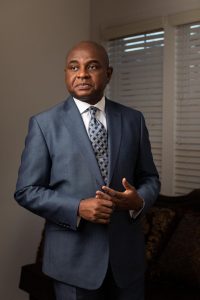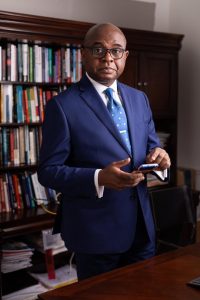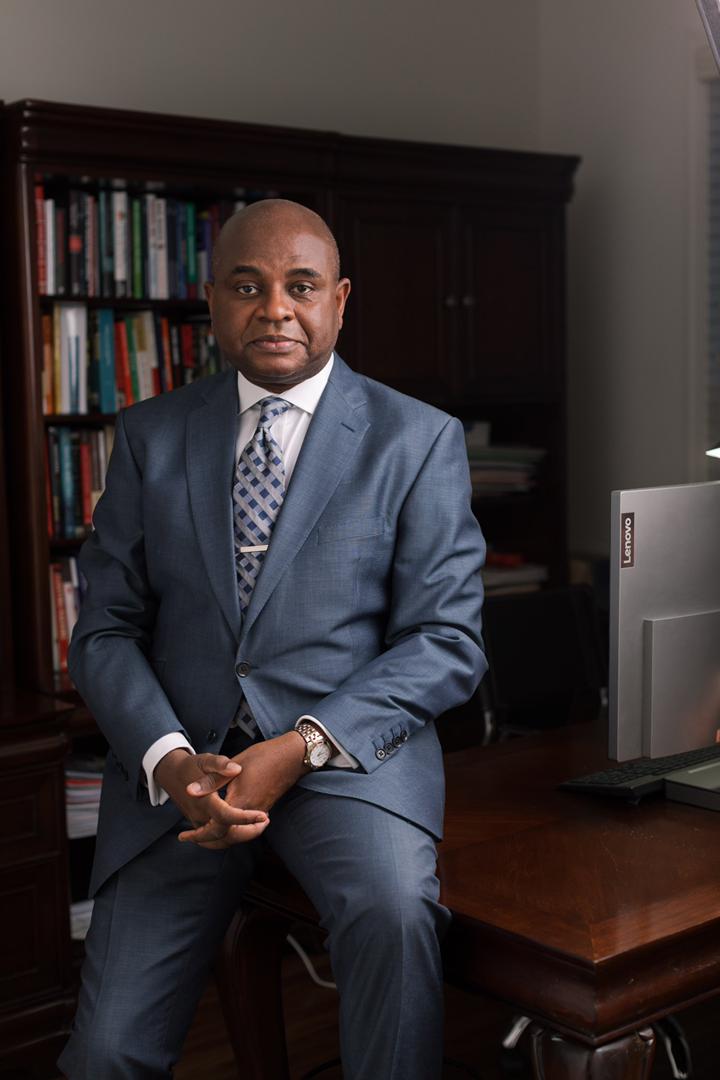| Popular opinion is that Kingsley Moghalu, eloquent technocrat whose ideas unite a divided Nigeria, is the best president the country has never had. The irony is in how a politician so massively endorsed is by the same token shortchanged for power. That contradiction has an apparent resolution, the accomplished professor tells Nigeria Abroad during an interview last weekend. |
Moghalu, who is running a second time for Nigeria’s president, says success came from his being intentional in his career moves: he always had an “international outlook” even while interning at Shell Nigeria and later working at then-famous Nigerian magazine, Newswatch.
Read Also : 2023: Who Leads Nigeria? With…..Days To Election, Search For A New President Begins – Obinna Chima
“Nigeria was becoming difficult in the 90s due to the Structural Adjustment Program and the liberalization of the economy. I would still have left because I wanted to work in the diplomatic world,” he reveals during the chat. Then he recounts an experience in Lagos which somewhat impacted his resolve to relocate.
Standing by the road on his way to work one Lagos morning, young Moghalu had his white shirt completely ruined by a mud splash from a passing vehicle. “I was so angry. I believed that kind of thing wouldn’t happen in the developed world because the roads would be better,” he recalls, and we share a laugh. That experience ranks low as immigration motivation in today’s Nigeria, where the youth are fleeing severe economic hardship and insecurity.
Moghalu’s immigration came a few years later, on a master’s fellowship to the prestigious Fletcher School of Law and Diplomacy at Tufts University in Massachusetts, USA. Though he studied for free, he had to work as a graduate assistant under two professors to pay his bills. “The pay was barely enough,” he tells Nigeria Abroad. “There were days I did 101”—days he had just breakfast and dinner, skipping lunch.
Read Also : 2023 Presidency: I’ll Run Again As A Nigerian, Not An Ethnic Candidate – Kingsley Moghalu
After his studies and work as a United Nations envoy to Cambodia, Angola, Croatia, Somalia, Rwanda, Tanzania, etc., the law professor, with a PhD in International Relations was beckoned to return home and serve as Nigeria’s deputy Central Bank governor. He worked in other capacities around the world after leaving the CBN, but his mind “turned to the increasing poverty and insecurity at home in Nigeria,” he notes in the recent article. “I began asking myself why I was in Boston developing the human capital of citizens of the United States, Japan, France, Canada, Ghana, Switzerland, etc., when my country was clearly adrift. I made the decision to return home to run for president in 2019.”
A constant sigh in his last presidential bid, given Nigeria’s blatant tribalism, was his Igboness. While a section of his Igbo people wanted to produce the president to redress perceived marginalization, Moghalu cultivated a certain Igbo aloofness, or so it seemed. Many see that as a sellout, I tell him.
“It’s a feeling that I understand,” he replies. “But it’s mistaken. I believe in justice for all. It’s a neutral value for me and it applies to every ethnicity and religion. What I tell my Igbo people is, two wrongs don’t make a right. The Igbo cannot successfully engage Nigeria from the outside. Secession is romantic but is not a practical possibility. There is the right to self-determination under certain conditions but it’s still subject to a country’s constitution.

Kingsley Moghalu
Part of Moghalu’s proposals to fix Nigeria is restructuring, a mantra slowly losing charm for its failure to materialize. Pushed mostly by politicians from Southern Nigeria, the concept has, at least twice failed to survive legislative reckoning. How does this ex-banker intend to execute his restructuring mission given that Southern Nigeria on its own cannot muster the two-thirds majority needed to effect the change?
Read Also : MY JOURNEY: A Personal Story – By Kingsley Moghalu
“At least four zones are interested in restructuring,” the economist says. “Southeast, Middle Belt, Southwest, and South-south—even some parts of the North. It’s all about negotiation. Everyone can see that Nigeria cannot function under the present system. We’re on a fiscal cliff. Government cannot generate enough revenue to run the country. Restructuring is inevitable; it’s only a matter of time.”
Under his presidency would emerge a fresh political will to actualize the idea, he states. Unlike President Muhammadu Buhari “who has constituted himself into an obstacle to restructuring,” Moghalu assures he will support the move as president. He says restructuring has yet to happen only because presidential endorsement, which would reassure and integrate dissent, is lacking. The problem is how to make him president come 2023, amid a broken electoral system and an atmosphere of ethnic paranoia in Nigeria.
I challenge what I consider his unrealistic optimism in Nigeria’s electoral system. “No, no, no. I don’t have confidence in it,” he rebuffs. “I have confidence in people coming out en masse to vote. Large numbers can overwhelm any rigging machine. That’s why I tell people to register to vote, and then vote. When you say you won’t vote because the system is already rigged, they (the riggers) are happy.”
Indeed, out of an estimated 150 million eligible Nigerian voters, only 84 million registered to vote in 2019—yet a paltry 28 million cast their votes in the presidential election. Massive turnout is just one of at least two prospective ways of putting Kingsley Moghalu in power.
Read Also : Babangida Rules Out Atiku, Tinubu From 2023 – Reveals The Next President Of Nigeria
The other is party politics. After losing his presidential run in 2019, Moghalu left the Young Progressives Party (YPP), a platform he helped establish. Recent speculations say he is planning to join either of Nigeria’s two biggest parties—the All Progressives Congress (APC); or the Peoples Democratic Party (PDP). He addresses the speculation.
“I left the YPP to focus on electoral reforms. I’ve not joined any major political party, but we are not ruling that out. We are looking at the whole thing. If either party would be brilliant enough to give me their ticket, such party would be 90% certain to win. But the question is, will they do it? There are lots of vested interests. The only way they can prove to Nigerians that they have reformed is by making such a radical decision—giving someone like me their ticket.”
So here’s the pathway to a Moghalu presidency: massive voting on the part of the people, and radical support from the political elite. The possibility, though remote, is not without promise.

Kinsgley Moghalu
For a man who emerged from relative obscurity to national limelight on the back of a brief presidential campaign, Moghalu deserves praise: few politicians achieve such visibility in four years. Instead, he has had to confront more criticism than his peers, as if a different bar was set for him—as if decent contenders deserve more scrutiny than the dirty lot. One critical talking point is that he has no political experience and should contest as governor in his home state of Anambra to prove his theories. He offers a long response to this:
Read Also :2023: Prof Kingsley Moghalu, The President Nigeria, World Of 21st Century Desires.
“Those who say that do not understand two important things. One, what are the duties of a president? They are mainly four: national security, nation-building, national economy, and foreign affairs/international relations. With my global leadership experience in security affairs, rebuilding broken nations, and international diplomacy all in the United Nations; and my leadership role in economic management in Nigeria at the CBN—not to mention my track record of success in all these roles—I am, in fact, more uniquely prepared to be Nigeria’s president than virtually all other competitors in the arena.
“To be president of Nigeria is not a local or provincial job; it is a national and international role in which you have to manage Nigeria’s diversity successfully to build a united nation. After nearly 20 years in the UN leading teams comprising officers and staff from all corners of the earth, diversity management is second nature to me.
“Two, my vision and experience are at the national level, and specifically the presidency, because once we get it right at that level of ultimate leadership, we can turn Nigeria and its economy around in a profound manner. I am not your typical politician. I am, in reality, a change agent, a leader who can bring good governance because that is what I’ve done all my life in global and national institutions that are well-governed.”
It’s been nearly an hour since this chat, which has examined myriad topics—how public-private-partnership can transform Nigeria’s infrastructure by letting private firms build tolled but well-maintained roads; how his father, a civil servant who never took bribes, shaped his ideals in life; and how Moghalu’s excellent public speaking drew from his membership of debating societies in secondary school. Then comes a question suggested by a Nigerian who knew of the interview: as president, what would Moghalu do with Nigeria’s controversial anti-gay law?
Read Also : 2023: NIGERIAN PRESIDENT OF IGBO EXTRACTION, WHAT NDI IGBO MUST DO – By St Kay Ephan
“The president doesn’t control the National Assembly,” he notes, while affirming the need to protect minorities. Indeed, though presidential assent completes the process of law-making, its withholding can be vetoed by two-thirds majority of the legislature. Repealing the law, Moghalu says, would require advocacy and lobbying in the legislature, the very organ that enacted it.
Moghalu’s second coming is different from the first: he declared early enough for the 2023 presidency and has already started engaging Nigerians. He also intends to build a massive publicly sourced campaign fund. Through his first time at electioneering, his 2019 campaign mobilized a goodwill that survives—a foundation upon which he can stand for greater visibility. Highly educated, urbane and personable, he inspires a great number of young Nigerians, especially the enlightened—and they could truly make him president if they turn up en masse and vote.
Alternatively, they can brilliantly debate the election on social media.

